This is an archive of prayers, songs, and other individual works relevant to the eleventh course of the seder for Pesaḥ (Passover): Barekh, containing the Birkat haMazon, the pouring of the cup for the psychopomp of Moshiaḥ, and the ritual opening of the door on Passover accompanied by the statement, “Sh’fokh Ḥamatkha.” Click here to contribute a work or a transcription and translation of a historical work that you have prepared for Barekh in the Seder Pesaḥ. Filter resources by Collaborator Name Filter resources by Tag Filter resources by Category Filter resources by Language Filter resources by Date Range
This is a poetic Birkat haMazon for Pesaḥ, from the Cairo Geniza (CUL T-S H11.88 1v). Much thanks to the work of Dr. Avi Shmidman, whose 2009 doctoral thesis is the foundational work for poetic Birkat haMazon studies. He marks it as Piyyut 64, and his Hebrew-language commentary begins on page 394 of his work. I’ve included two translations of the poetic portions — one literal and one preserving the acrostic and rhyme scheme. . . . Categories: Tags: Contributor(s): A paraliturgical adaptation of the prayer/curse, “Shfokh Ḥamatekha,” this prayer, likely written during, or just after the Holocaust, recognizes those nations and righteous gentiles who fought and risked their lives to aid and rescue European Jewry. . . . Categories: Tags: Contributor(s): We lift Miriam’s cup, Dancing prophet celebrating the world that is now. And we tell God we are grateful For the water from the earth that was Miriam’s gift, Welcome necessity, On God’s behalf. Miriam announces joy! And teaches us to save ourselves. Miriam, the bringer of mercy, There’s no prayer for her in the haggadah— So make one up! . . . Categories: Tags: Contributor(s): Although God often speaks to humanity in the rumble of earthquakes, the roaring of wind and the thunder of storms, God spoke to Elijah, instead, in a still small voice. And, it was the nurturing power of the still small voice that slowly gave Elijah the courage and strength to be able to peek out of his deep abyss. On this night when we welcome Elijah to join our celebration, we acknowledge those who are so pained that they cannot fully celebrate, for joy eludes them. Although we may witness their physical wound with our eyes, we must also find ways to become attuned to their spiritual hurt and their emotional despair. The blood from the wound in their heart may not be visible and the cry in the depth of their throat may not be audible unless we train ourselves to attend to them. But, they are there. Our challenge is see and hear the pain of those whose depression affects their lives. Our response does not have to be bold in order to make a difference. A still small voice can transform a frown into a smile. A caring whisper that says, “I care” can raise a stooped head. A tender embrace can provide salve to a soul racked with pain. . . . Categories: Tags: 21st century C.E., 58th century A.M., community support, אליהו הנביא Eliyahu haNavi, haggadah supplements, Needing Vocalization, North America, Psychopomp, still small voice, suicide, suicide awareness, suicide prevention Contributor(s): Rabbi Yosi son of Rabbi Yehuda says: “Three good sustainers arose for Israel. These are they: Moses and Aaron and Miriam. And three good gifts were given because of them, and these are they: well, and cloud, and manna. The well was given in merit of Miriam… Miriam died and the well ceased, as it is written (Numbers 20:1-2) “And Miriam died there,” and it says right afterwards “and there was no water for the community.” . . . Categories: Tags: Contributor(s): Pearl Benisch… remembers Passover in the Bergen-Belsen concentration camp in Germany in the spring of 1945, just days before her liberation. . . . Categories: Tags: Contributor(s): Written on 6 Nisan 5783, 27 March 2023 (after nightfall), in response to the Israeli people’s spontaneous demonstrations against the government’s attempts to amass virtually unchecked power. . . . Categories: Tags: Contributor(s): |



